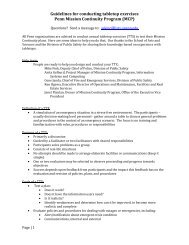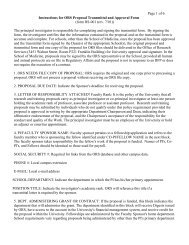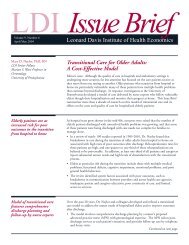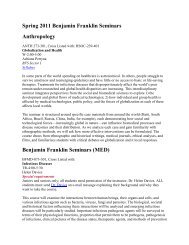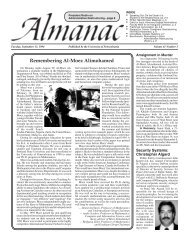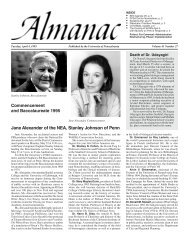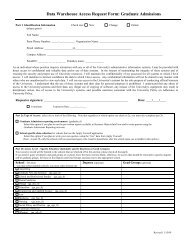2009-2010 COURSE REGISTER - University of Pennsylvania
2009-2010 COURSE REGISTER - University of Pennsylvania
2009-2010 COURSE REGISTER - University of Pennsylvania
You also want an ePaper? Increase the reach of your titles
YUMPU automatically turns print PDFs into web optimized ePapers that Google loves.
ancient literary tradition, and the<br />
similarities and differences between the<br />
ancient and modern practice <strong>of</strong> history.<br />
SM 314. (CLST314, HIST314) Roman<br />
Law and Society. (M) Distribution<br />
Course in Hist & Tradition. Class <strong>of</strong> <strong>2009</strong><br />
& prior only. Staff.<br />
Roman magistrates, emperors, jurists, and<br />
lawyers developed many <strong>of</strong> the<br />
fundamental legal principles that have<br />
remained at the basis <strong>of</strong> our modern legal<br />
systems. This course will introduce the<br />
students to the principal sources <strong>of</strong> the<br />
roman law, to the nature <strong>of</strong> legal actions<br />
and trial procedures (for both civil litigation<br />
and criminal prosecution), and also to the<br />
main institutions <strong>of</strong> the legal system. There<br />
will be strong emphasis on the basic<br />
principles and norms <strong>of</strong> the Roman law<br />
itself. The main areas <strong>of</strong> the civil law that<br />
will be dealt with in detail will include the<br />
law <strong>of</strong> persons, succession, obligations<br />
(including contracts and damage), delicts<br />
and 'crimes'. The application <strong>of</strong> the law in<br />
social contexts will be studied by the<br />
consideration <strong>of</strong> historically documented<br />
cases such as a murder trial, a dispute over<br />
a sale, and divorce proceedings. The<br />
analysis <strong>of</strong> model cases will also be an<br />
important part <strong>of</strong> each student's<br />
involvement in the class.<br />
323. (CLST323, HIST334) Greek<br />
World After Alexander the Great. (M)<br />
McInerney.<br />
SM 376. (CLST376, HIST376)<br />
Slavery/Society Ancient Rome. (M)<br />
Distribution Course in Hist & Tradition.<br />
Class <strong>of</strong> <strong>2009</strong> & prior only. Staff.<br />
This class examines the phenomenon <strong>of</strong><br />
slavery in Roman society. A careful<br />
reading <strong>of</strong> primary sources, including many<br />
inscriptions dealing with the life and death<br />
<strong>of</strong> slaves will be combined with modern<br />
critical readings in order to explore the<br />
institution <strong>of</strong> slavery and to increase our<br />
understanding <strong>of</strong> slavery both to the Roman<br />
economy and Roman society. We will try<br />
to determine where the slaves came from,<br />
how guaranteeing a slave supply affected<br />
Roman policies abroad, and how slaves<br />
reached the markets <strong>of</strong> Rome, Delos, and<br />
North Africa. We will also look at the<br />
relationship between slaves and masters in<br />
the Roman household. What tasks did they<br />
perform, what treatment could they expect,<br />
and how did the presence <strong>of</strong> a significant<br />
portion <strong>of</strong> the population in servitude affect<br />
the social relations governing Roman<br />
society. We will also examine the position<br />
<strong>of</strong> slaves in Roman law and examine<br />
changing attitudes towards the rights <strong>of</strong><br />
slaves. Finally, using slave narratives from<br />
the antebellum south, we will explore the<br />
possibility <strong>of</strong> reconstructing the slave<br />
experience in Roman society.<br />
399. Independent Study. (C)<br />
499. Independent Study. (C)<br />
510. (LATN510) Latin Historical<br />
Documents. (M) Distribution Course in<br />
Hist & Tradition. Class <strong>of</strong> <strong>2009</strong> & prior<br />
only. Staff.<br />
The analysis <strong>of</strong> non-literary Latin texts<br />
from antiquity preserved on various types<br />
<strong>of</strong> permanent media, mainly stone and<br />
metal, is the primary concern <strong>of</strong> the<br />
discipline <strong>of</strong> Latin epigraphy. Such texts,<br />
which have been recovered in hundreds <strong>of</strong><br />
thousands, constitute one <strong>of</strong> the most<br />
important sources <strong>of</strong> data for the modernday<br />
historian <strong>of</strong> Rome. The student will be<br />
introduced to the conventions <strong>of</strong> editing<br />
and reading epigraphical texts, and to the<br />
major collections <strong>of</strong> Latin inscriptions. The<br />
seminar will then concentrate on different<br />
types <strong>of</strong> documents in order to understand<br />
their formatting and style, as well as the<br />
kinds <strong>of</strong> historical evidence that can be<br />
derived from them. Public and private<br />
inscriptions, from the decrees <strong>of</strong> emperors<br />
and senatorial careers to personal curse<br />
tablets and the simple tombstone epitaphs<br />
<strong>of</strong> the urban poor, will be considered as<br />
examples <strong>of</strong> the range <strong>of</strong> epigraphical texts<br />
available to the modern researcher.<br />
SM 512. Methods in Roman History.<br />
Staff.<br />
SM 535. (HIST535) Problems in<br />
Ancient History. (C) Staff.<br />
A separate topic is <strong>of</strong>fered in either the<br />
history <strong>of</strong> Ancient Near East, Greece or<br />
Rome.<br />
SM 601. (AAMW601, CLST601)<br />
Archaeology and Greek History. (C)<br />
Staff.<br />
SM 602. Athenian Economy. (M)<br />
Cohen.<br />
This course will examine the material and<br />
social culture <strong>of</strong> classical Athens. Through<br />
a close reading <strong>of</strong> original sources<br />
(primarily court presentation and comic<br />
productions) and through the evaluation <strong>of</strong><br />
modern studies, we will seek to understand<br />
the societal,familial, economic, religious<br />
and sexual dimensions <strong>of</strong> the Athenian life,<br />
and to evaluate the alleged dictorial<br />
dominance <strong>of</strong> this society by the small<br />
minority <strong>of</strong> male "citizens." The class will<br />
deal with such topics as the legal, social<br />
and fiancial position <strong>of</strong> wealthy slaves and<br />
ANCIENT HISTORY<br />
business women; the clandestine economy<br />
<strong>of</strong> tax evasion and bank fraud; the political<br />
and economic content <strong>of</strong> male and female<br />
prostitution.<br />
The entire seminar will study certain<br />
core materials, and individual students will<br />
report on selected subjects. Admission is<br />
open to those with a reading knowledge <strong>of</strong><br />
ancient Greek and/or some expertise in<br />
social science discipline broadly-defined<br />
(such as history, gender studies, economics,<br />
anthropology or law).<br />
SM 611. (GREK611) Greek Epigraphy.<br />
(M) Staff.<br />
An introduction to the principles and<br />
practices <strong>of</strong> Greek Epigraphy. Study <strong>of</strong><br />
selected Greek inscriptions.<br />
SM 616. (CLST616) Ancient<br />
Economies. (C) Grey.<br />
Scholars have long debated the nature <strong>of</strong><br />
the ancient economy, the terms in which it<br />
can best be approached, and the decisionmaking<br />
processes that underpinned<br />
economic behavior in antiquity. In<br />
particular, controversy has surrounded the<br />
extent to which the economies <strong>of</strong> Greco-<br />
Roman antiquity can be modeled using<br />
contemporary tools <strong>of</strong> analysis. In recent<br />
scholarship, many <strong>of</strong> the tenets laid down<br />
by Moses Finley in his The Ancient<br />
Economy have been re-evaluated, with the<br />
result that the field is currently in a state <strong>of</strong><br />
intellectual ferment. It is the purpose <strong>of</strong><br />
this course to explore the terms in which<br />
contemporary debates over ancient<br />
economic systems are formulated, with<br />
reference to a variety <strong>of</strong> societies and<br />
periods, from the palace economies <strong>of</strong> the<br />
Mycenaean period to the system <strong>of</strong> taxation<br />
introduced in the early fourth century by<br />
the emperor Diocletian and his colleagues<br />
in the Tetrarchy.<br />
SM 620. Power, Money, & Gender in<br />
Ancient Athens. (M) Cohen.<br />
This course will examine if and how<br />
"power" --- the manifold aspects <strong>of</strong> control,<br />
command and influence in a society ---<br />
transcended political arrangements in<br />
classical Athens, and manifested social,<br />
economic and sexual dimensions. Through<br />
a close reading (in Greek or English, as<br />
students prefer) <strong>of</strong> Athenian court<br />
presentations and comic material and<br />
through the evaluation <strong>of</strong> modern studies,<br />
we will seek to understand the social,<br />
economic, and sexual dimensions <strong>of</strong><br />
Atheninan life. The class will deal with<br />
such topics as the alleged dictorial<br />
dominance <strong>of</strong> Athenian life. The class will<br />
deal with such topics as the alleged<br />
dictorial dominance <strong>of</strong> Athenian society by<br />
the small minority <strong>of</strong> male "citizens,"; the<br />
Page 21





